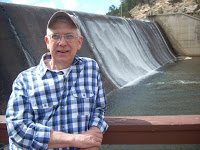I recall hearing the same weather adage used in different parts of the country as if it described a particular distinctive in each place. The adage: If you don’t like the weather, wait a few minutes; it will change. I first heard this saying in Kansas where the wind seemed always to blow. The constant wind seemed to be accompanied by fickle temperatures and varying precipitation, and sometimes even the wind changed by increasing, declining, or becoming a threatening vortex that threatened one’s property and life.
When as an adult I moved first to Texas, then Missouri, then New Mexico, then Colorado, and then Oklahoma, I heard the same claim. I’ve heard the adage spoken about atmospheric conditions in Ontario, Vermont, New York, California, North Dakota, and Wyoming. Surely the same is said in Wales, South Africa, Australia, and New Zealand. I suspect I’d hear it in Russia, China, and Bora Bora if I were to go to those places and understand their languages. Am I complaining about human complaining and sameness? Not really although we can get really boring.
What I am interested to say today is that I’ve learned more about myself by observing the weather in contrasting climates. For instance, while living in Mid-Missouri, a place with high humidity, wide seasonal changes in temperatures, and the same number of contrasting hot and cold fronts as the rest of the country, I would get headaches when the barometer plunged. Eventually the headaches became intense enough I would leave work, go home, take ibuprofen, and lie down to sleep. Within an hour I’d be just fine and return to work. A few years later I moved to dry, dry Albuquerque. I quit having the headaches, but eventually I noticed I’d have a change in mood when the barometer plunged. I was more fascinated than concerned. I’d never noticed any change of mood in my whole life being mostly sunny and hopeful and silly and laughing. The mood swing would last about one hour. For that I was thankful and eventually connected these events with the old headaches I’d had in Missouri. Finally I realized that in Missouri I constantly had sinus and Eustachian tube problems. The barometric change caused the headache that probably masked a mood change. In the dry air of New Mexico I liked having a simple mood change because I didn’t have to interrupt my work. I learned to take the ibuprofen anyway and within an hour or less my mood went back to generally sunny.
The new experiences did raise a question for me. I had observed my father’s increasing difficulties with depression as he aged. Was I in for the same? Thankfully, I have not yet experienced what he did, something I suppose relates to inheriting my mother’s positive outlook which surely arose from her brain chemistry. My dad’s health often challenged him; his heart attacks, the rare tic douloureux (trigeminal neuralgia) pain disease, spinal meningitis, and eventual stroke made life difficult. Depression was not surprising. Now I too have experienced depression, thankfully at a sub-clinical level. I take St. John’s Wort to good effect and when the barometer drops, sometimes double my dosage.
I have another weather query though. How does climate change affect the weather? Will global warming change the weather and one’s experience of its power? My experience suggests that one still suffers the weather wherever one lives; I say suffer because one has no real control of the weather. I also found that a change in my life from straight to gay seemed like a move to a much better climate. Overall, my life seemed enriched and often more fulfilling. My life seemed more authentically ‘me’ bringing thrills, insights, and a sense of rightness. Still the headaches, mood changes, and general challenges of life moved with me into this new authentic-feeling climate. You know what I mean; in summer it can still be too darn hot even if your baby is the same brand of gay as you!
About the Author
Phillip Hoyle lives in Denver and spends his time writing, painting, and socializing. Following thirty-two years in church work and fifteen practicing massage, he keeps busy with groups of writers and artists and volunteers at The Center leading the SAGE program “Telling Your Story.”
He also blogs at artandmorebyphilhoyle.blogspot
